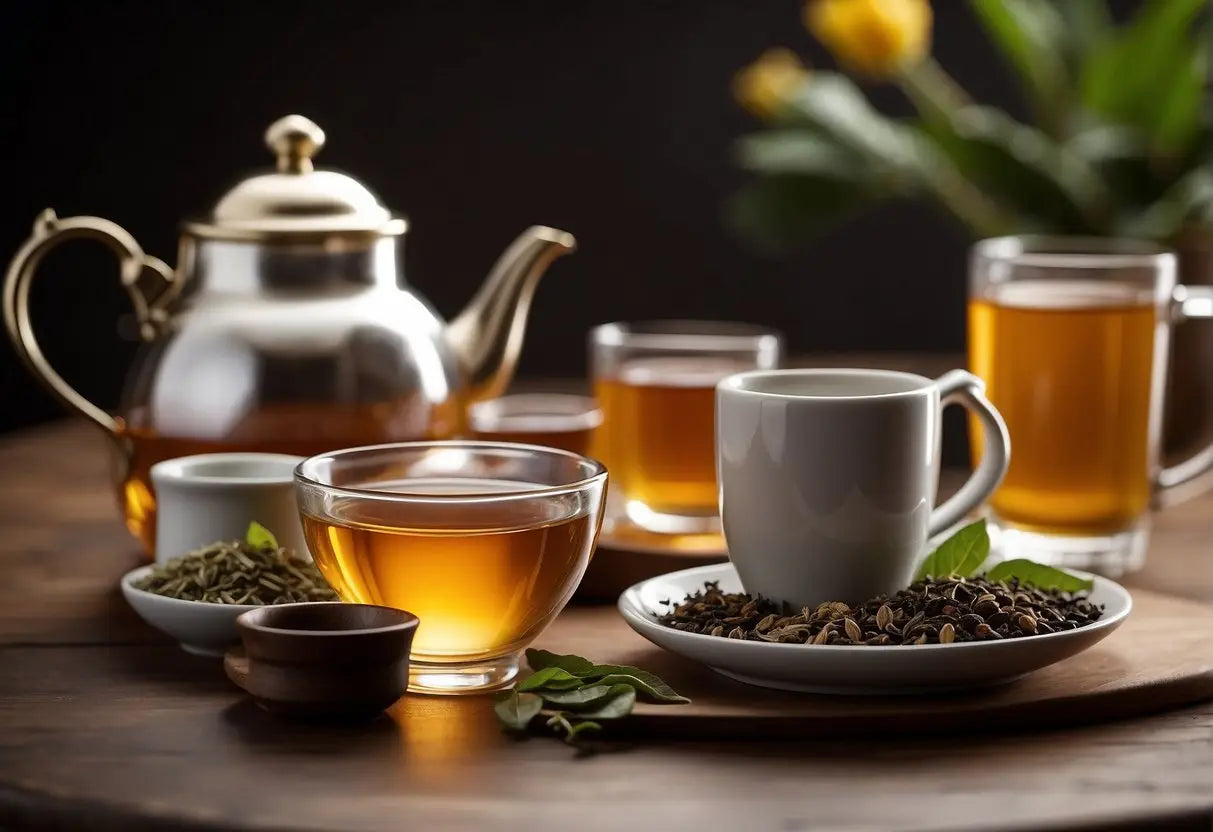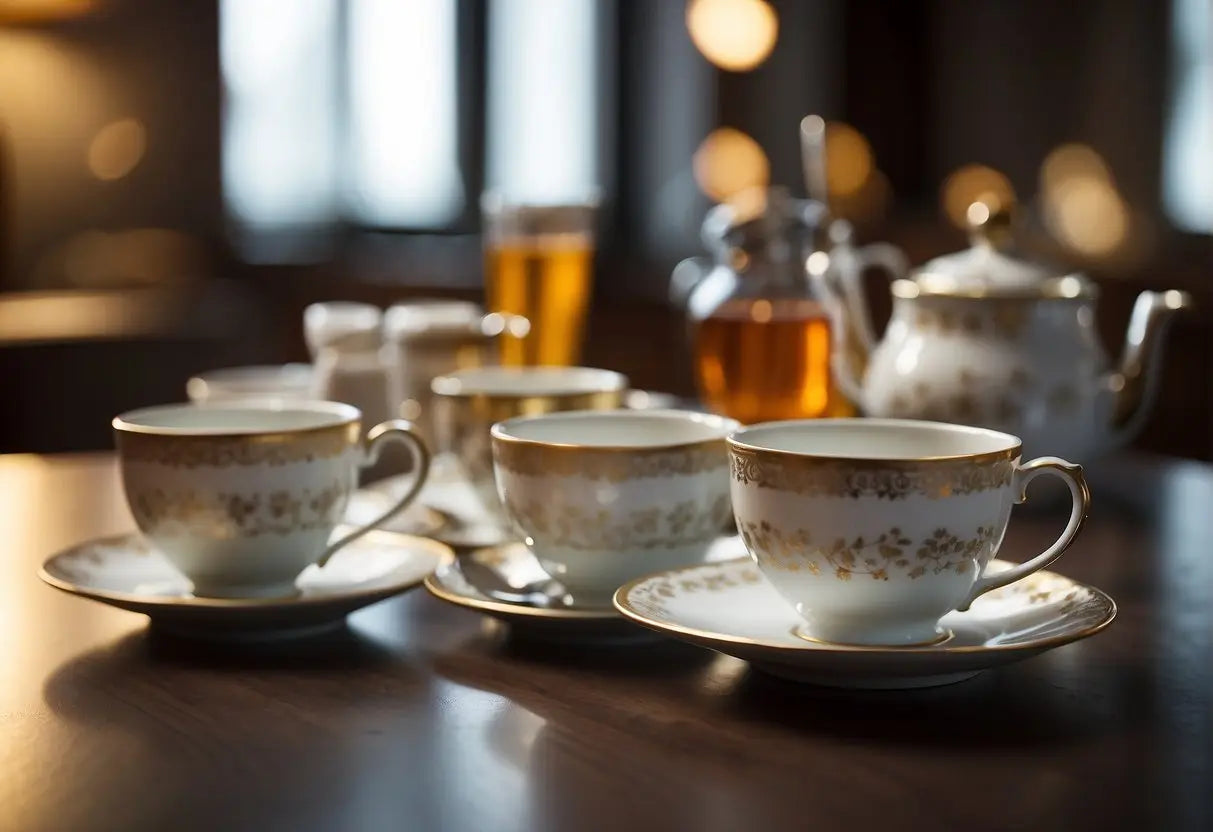How Much Tea Is Too Much
Tea is a widely consumed beverage cherished for its variety of flavors and potential health benefits. When gauging how much tea is ideal for you, be aware of several key factors.
Types of Tea: Different teas contain varying amounts of caffeine. For instance, black tea generally has more caffeine than green tea.
- Black tea: approximately 47 mg caffeine per cup
- Green tea: approximately 28 mg caffeine per cup
Daily Limits: Health professionals suggest limiting caffeine intake to about 400 mg per day for adults, which equates to roughly 8-10 cups of green tea or 4-5 cups of black tea.
Bestsellers
Personal Sensitivity: Your tolerance to caffeine may impact how much tea you can consume comfortably. Signs of overconsumption include:
- Insomnia
- Headaches
- Nervousness
- Rapid heartbeat
Health Conditions: Some conditions, like anxiety or pregnancy, call for reduced caffeine intake. Consult your healthcare provider for personalized advice.
Remember, moderation is key in tea consumption to enjoy its benefits without adverse effects.
Health Benefits of Tea

Tea offers a variety of health benefits due to its rich composition of antioxidants and positive effects on hydration and fluid balance.
Antioxidants and Health
Tea is known for its high level of antioxidants, which protect your cells from damage. These compounds, particularly a group known as flavonoids, have been linked to a reduction in the risk of certain chronic diseases.
- Green tea: Contains high levels of catechins, shown to improve blood flow and cholesterol levels.
- Black tea: Rich in theaflavins and thearubigins, which have been associated with lower rates of stroke.
Hydration and Fluid Balance
Drinking tea can contribute to your daily fluid intake and help maintain good hydration status.
- Water content: A cup of tea is predominantly water, naturally hydrating you with every sip.
- Caffeine levels: Although tea contains caffeine, the levels are typically lower than coffee, reducing the risk of dehydration.
It's important for you to consider individual sensitivity to caffeine and opt for herbal or decaffeinated varieties if necessary.
Risks of Excessive Tea Drinking

Consuming tea in moderation can be a pleasant and healthy habit, but excessive intake can lead to health issues that you should be aware of.
Caffeine Overdose
Tea contains caffeine, a stimulant that can lead to overdose if consumed in large amounts. Initial symptoms often include restlessness, increased heart rate, and insomnia. Chronic intake of high quantities of caffeine may contribute to more serious conditions like anxiety disorders, and in extreme cases, may cause heart palpitations or arrhythmias.
| Symptoms of Caffeine Overdose | Severity |
|---|---|
| Restlessness | Mild |
| Increased Heart Rate | Moderate |
| Insomnia | Moderate |
| Anxiety Disorders | Severe |
| Heart Palpitations | Severe |
Nutritional Deficiencies
Excessive tea consumption, especially on an empty stomach, can interfere with the absorption of vital nutrients. Tannins present in tea can bind to iron and reduce its absorption, which might lead to iron deficiency anemia. Furthermore, drinking tea excessively may lead to a reduced intake of fluids like milk or fortified juices, possibly resulting in a deficiency in calcium or vitamins.
Lao Ban Zhang
- Iron Absorption: Tea’s tannins reduce iron absorption, potentially leading to anemia.
- Reduced Intake of Other Fluids: Can cause calcium and vitamin deficiencies.
Recommended Daily Intake

Tea is a widely enjoyed beverage, but like many things, it should be consumed in moderation. Health experts suggest that you can safely drink 3 to 4 cups of tea daily. This equates to roughly 200 to 300 milligrams of caffeine for a healthy adult individual.
- Black & Oolong Tea: High in caffeine; limit to 3 cups daily
- Green & White Tea: Lower caffeine; up to 4 cups is typically safe
- Herbal Tea: Usually caffeine-free; varies depending on ingredients
Be mindful of the following considerations:
- Pregnancy: If you're pregnant, the recommended limit is below 200 milligrams of caffeine per day, translating to about 2 cups of black tea.
- Medical Conditions: For those with heart problems, anxiety disorders, or insomnia, it's advisable to lower intake or consult with your doctor.
- Iron Absorption: Tea can inhibit iron absorption due to its tannin content. Drinking tea between meals can help minimize this effect.
Please note that individual tolerance varies. It's important to listen to your body and adjust your intake accordingly. If you experience jitters, restlessness, or disrupted sleep, consider reducing your tea consumption
Factors Affecting Tea Tolerance

How much tea you can safely consume can be influenced by several factors unique to you, such as your health status and genetic makeup.
Individual Health Conditions
- Caffeine Sensitivity: If you have a lower threshold for caffeine, even small amounts of tea can lead to jitteriness or sleep disturbances. For example, if you suffer from anxiety, you might be more sensitive to caffeine.
- Medical Conditions: Certain health issues like heart conditions or ulcers may increase your risk of side effects from tea consumption. If you have iron absorption issues, tea might further inhibit your body's ability to absorb iron.
Genetic Variability
- Metabolism Rate: Your genetic makeup impacts how quickly your body processes caffeine. Fast metabolizers can handle more tea without adverse effects, whereas slow metabolizers may experience negative symptoms with a lower intake.
- Taste Perception: Your genetics also affect how you perceive bitterness, influencing how much tea you might enjoy or tolerate. If you're sensitive to bitter tastes, you're likely to drink less tea.
Types of Tea and Caffeine Content
When you select a type of tea, know that each variety differs in caffeine content. Black tea contains the highest caffeine content, with about 40-70 mg per 8 oz cup, while green tea usually has less, typically 20-45 mg for the same size serving. Oolong tea falls between the two, averaging around 30-50 mg per cup.
| Type of Tea | Caffeine Content (per 8 oz cup) |
|---|---|
| Black Tea | 40-70 mg |
| Oolong Tea | 30-50 mg |
| Green Tea | 20-45 mg |
| White Tea | 15-30 mg |
| Herbal Tea | 0 mg |
White tea offers a gentler caffeine boost, with just about 15-30 mg per cup. Herbal teas are naturally caffeine-free and are not made from Camellia sinensis leaves, which is why they contain 0 mg caffeine.
Keep in mind that how you brew your tea can impact caffeine levels. Steeping your tea for longer periods increases caffeine concentration, while adding milk or water can dilute it.
Take note of matcha, a specially prepared powdered green tea. It typically contains more caffeine than standard green tea—around 70 mg per cup—since you consume the whole leaf in powdered form.
Always check the packaging or consult with the tea provider for the most accurate caffeine content information, as it can vary widely between brands and specific blends.
Monitoring Tea Consumption
Tracking your tea intake carefully is crucial to avoid the negative side effects associated with consuming too much tea.
Keeping a Consumption Diary
Keep a daily log to monitor the amount of tea you drink. Use bold for the date and italic for notes on how you felt that day:
- February 4, 2024: 3 cups - no noticeable symptoms
- February 5, 2024: 4 cups - slight headache in the evening
By documenting your consumption, you can identify patterns and adjust accordingly.
Recognizing Symptoms of Excess
Be aware of signs that may indicate you're drinking too much tea:
- Restlessness and sleep disturbances
- Irregular heartbeat or palpitations
If you experience these symptoms, consider reducing your tea intake. Regularly review your consumption diary to help identify correlations between symptoms and your tea consumption.
When to Consult a Healthcare Professional
If you experience any of the following symptoms after drinking tea, you should consult a healthcare professional:
- Heart palpitations or rapid heartbeat
- Insomnia or significant sleep disturbances
- Dizziness or lightheadedness
- Persistent headaches
- Tremors or jitteriness
- Gastrointestinal upset
These symptoms could indicate that you're consuming too much caffeine, a common component in tea. Safe levels of caffeine consumption vary among individuals. If you are pregnant, breastfeeding, have a heart condition, or suffer from anxiety disorders, you may need to consume even less.
Here's a quick checklist to gauge if you need to see a professional:
- You're drinking more than 3-4 cups of tea daily and experiencing side effects.
- You rely on tea to avoid withdrawal symptoms like headaches or irritability.
- You've attempted to cut back on tea but are unsuccessful.
Remember, your body's reaction to tea can change over time. Regularly review your consumption habits and how they affect your well-being. If in doubt, it is always safer to seek medical advice.
Frequently Asked Questions
In this section, you will find specific answers to common concerns about overconsumption of tea and its various impacts on health.
Can consuming too many cups of tea cause health issues?
Yes, excessive tea consumption can lead to health issues such as stomach upset, sleep disturbances, and in some cases, can contribute to iron deficiency anemia due to its impact on iron absorption.
What are the potential side effects associated with excessive tea consumption?
Drinking too much tea can result in side effects like headaches, nervousness, sleep problems, irregular heartbeat, and in severe cases, can lead to convulsions.
Are there risks to kidney health from drinking large quantities of tea?
Yes, high levels of tea consumption can increase the risk of kidney stones, particularly due to the oxalate content in black tea, and can stress the kidneys if consumed in large quantities over a long period.
What are the effects of drinking too much herbal tea?
Overindulgence in herbal tea can lead to various side effects depending on the herbs used. Some teas may cause liver toxicity, drug interactions, or exacerbate health conditions if consumed in large amounts.
How does the intake of milk tea impact one's health when consumed excessively?
Excessive consumption of milk tea can lead to weight gain due to the added calories from milk and sugar, and may also contribute to increased cholesterol and saturated fat intake.
Is there an optimal number of tea cups recommended for weight loss purposes?
While tea, especially green tea, can be a component of a weight-loss diet due to its metabolism-boosting properties, moderation is key. Drinking 2-3 cups per day is generally considered safe and potentially beneficial for weight loss, provided it's coupled with a balanced diet and physical activity.
← Older post Newer post →











